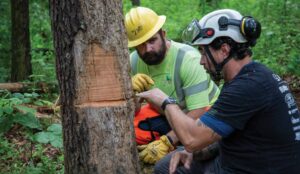Scott Hornblower remembers the very first day of his job at the Bloomington headquarters of agricultural cooperative GROWMARK. He knew exactly where to park, he was confident in the location of his office, and even was able to speak to a number of his colleagues on the way in the building. Not only was Hornblower comfortable with his new surroundings, he was familiar with them because he had already spent several months at GROWMARK as a college intern.
Internships have become a popular way for college students to strengthen their resumes and gain real-world experience to supplement the knowledge they are gaining in the classroom.
“An internship is an experience for a student where they can learn what it’s like to be in a particular job or in a particular industry or field,” explains Tori Spring, assistant director for experiential learning at the University of Illinois. “Typically, it is more than a part-time job. It’s a position that will give real-world experiences over the course of a semester or summer.”
While most internships are full-time positions over a summer, some programs last an entire semester. Depending upon the industry, interns may receive a salary or stipend; most all have ways to earn academic credit for the job experiences.
“For students, internships are great for the resume,” explains John Oliver, career services coordinator at Richland Community College in Decatur. “Students are able to learn their strengths and weaknesses and discover the things they need to work on when they get back to school. Plus, there is lots and lots of networking. It’s very rewarding to students.”
Michaela Murphy of DeKalb, a senior in graphic design at Southern Illinois University recently completed an internship with the Chicago Fire Major League Soccer Team. She says it was a great experience.
“You hear about all of these things in class, but wonder if it really is that way in the ‘real world.’ This is how you find out,” she says. “I think it gave me more confidence in my field to get encouragement and critiques from professionals.”
Internships are a great opportunity for employers, too. Like Hornblower’s experience at GROWMARK, these part-time student jobs often lead to full-time positions after graduation.
“I always say that internships are a sort of mutual interview,” Amy Hasselbring, university relations manager with GROWMARK explains. “For us, it is 12 weeks for the students to see what our company is like and 12 weeks for us to see if they are a good fit.”
Hasselbring’s system of cooperatives has employed more than 1,000 interns over 58 years. Like Hornblower, she also is a former intern with the company.
“Internships often turn into job offers,” says Gary Hunter, professor and co-director of internships for Illinois State University’s marketing department. “I think they give students a chance to try on a career and they get a taste of the real world.”
Richland Community College culinary student Jonathan Cox of Lincoln went back to school at age 51 just to learn to be a better cook. But, after completing an internship overseeing food preparation in the employee cafeterias and working with special event catering for Decatur-based Archer Daniels Midland, he says his desire is to continue with the company.
“I wasn’t looking for employment, but this has been a wonderful experience. I really, really love this job. My hope is to stay with ADM once my internship is over,” he says.
Many employers find internships to be a fast-track to finding great employees. Bruce Giffin, general manager of Winchester-based Illinois Electric Cooperative says his organization has often used interns not only to benefit the company, but also to find prospective team members. He says the program started in 1997 with one intern and since has had more than 175 interns, from a wide variety of colleges and universities. He adds that preference for internships goes to the children of the rural electric cooperative’s members and that many of IEC’s interns have worked multiple summers.
“It’s a good program for the co-op in that it touches our members’ lives in a real and productive way and it leads us to hiring that is absolutely no-risk. If you’ve known a young person for three years, that’s a lot better than just a couple of job interviews,” he says, adding that the internship program has helped him find quality employees.
“An aging workforce is one of the top challenges for rural electric cooperatives. From our internship program we have been able to hire an electrical engineer, a computer scientist, a communications specialist and several linemen. They are all under the age of 26. I could not have gotten them to come to work for us if they would not have known us as interns.”
Even students who are unable to give up an entire summer or semester can benefit from specialized internship programs coordinated by some universities. Southern Illinois University offers what the school calls “externships” to give students insight into real-world experiences.
“Externships are a week-long job shadow experience that we conduct over spring break,” explains Matt Purdy, associate director of Career Services at SIU. “We place as many as 150 students each year with organizations who have expressed interest for hosting a student for that week.”
He says the program is a function of the SIU Alumni Association, so organizers try to place students with SIU graduates, but the main goal is to get them exposure to their chosen field.
“It is nice when students go somewhere and discover that it is what they really want to do, but I’d say it is even more valuable when they discover that it’s not where they want to be. I think every student gets something out of the program,” he adds.
Spring says the University of Illinois offers a program called UIntern which places students in unpaid summer positions with central Illinois not-for-profit organizations. “I strongly encourage students to do anything that will give them experiences in their potential career field,” she says.
Hornblower says his internship was of tremendous value. “It was a great experience and I think it is for any student,” he says. “While you may not get all of the technical things you need, you certainly get an introduction to your field and to a possible employer. It worked for me.”










